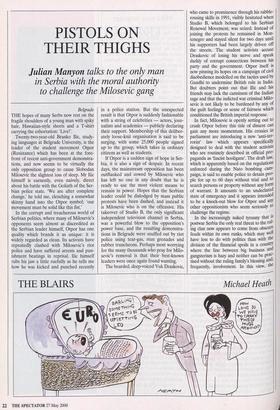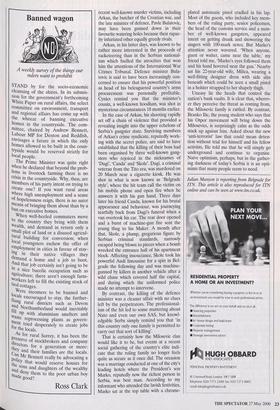PISTOLS ON THEIR THIGHS
Julian Manyon talks to the only man
in Serbia with the moral authority to challenge the Milosevic gang
Belgrade THE hopes of many Serbs now rest on the fragile shoulders of a young man with spiky hair, Hawaiian-style shorts and a T-shirt carrying the exhortation: `Live!'.
Twenty-two-year-old Branko the, study- ing languages at Belgrade University, is the leader of the student movement Otpor (Resistance) which has been at the fore- front of recent anti-government demonstra- tions, and now seems to be virtually the only opposition group to cause Slobodan Milosevic the slightest loss of sleep. Mr Ilic himself is earnestly, even naively, direct about his battle with the Goliath of the Ser- bian police state. 'We are after complete change,' he told me, clenching a somewhat skinny hand into the Otpor symbol; 'our movement must be solid like this fist.'
In the corrupt and treacherous world of Serbian politics, where many of Milosevic's opponents seem almost as discredited as the Serbian leader himself, Otpor has one quality which brands it as unique: it is widely regarded as clean. Its activists have repeatedly clashed with Milosevic's riot police and have suffered arrests and pun- ishment beatings in reprisal. Ilic himself rubs his jaw a little ruefully as he tells me how he was kicked and punched recently in a police station. But the unexpected result is that Otpor is suddenly fashionable with a string of celebrities — actors, jour- nalists and academics — publicly declaring their support. Membership of this deliber- ately loose-knit organisation is said to be surging, with some 25,000 people signed up to the group, which takes in ordinary citizens as well as students.
If Otpor is a sudden sign of hope in Ser- bia, it is also a sign of despair. In recent days, the mainstream opposition has been outflanked and cowed by Milosevic who has left no one in any doubt that he is ready to use the most violent means to remain in power. Hopes that the Serbian leader could be dislodged by mass public protests have been dashed, and instead it is Milosevic who is on the offensive. His takeover of Studio B, the only significant independent television channel in Serbia, was a powerful blow to the opposition's power base, and the resulting demonstra- tions in Belgrade were snuffed out by riot police using tear-gas, stun grenades and rubber truncheons. Perhaps most worrying for the many thousands who pray for Milo- sevic's removal is that their best-known leaders were once again found wanting.
The bearded, deep-voiced Vuk Draskovic, who came to prominence through his rabble- rousing skills in 1991, visibly hesitated when Studio B, which belonged to his Serbian Renewal Movement, was seized. Instead of joining the protests he remained in Mon- tenegro and stayed silent for two days until his supporters had been largely driven off the streets. The student activists accuse Draskovic of losing his nerve and speak darkly of corrupt connections between his party and the government. Otpor itself is now pinning its hopes on a campaign of civil disobedience modelled on the tactics used by Gandhi to undermine British rule in India. But doubters point out that the and his friends may lack the canniness of the Indian sage and that the indicted war criminal Milo- sevic is not likely to be burdened by any of the guilt feelings or sense of fairness which conditioned the British imperial response. In fact, Milosevic is openly setting out to crush Otpor before this tide of dissent can gain any more momentum. His cronies in parliament are introducing a new `anti-ter- rorist' law which appears specifically designed to deal with the student activists who are routinely described in official pro- paganda as 'fascist hooligans'. The draft law, which is apparently based on the regulations enforced during the Nato bombing cam- paign, is said to enable police to detain peo- ple for up to 60 days without trial and to search persons or property without any form of warrant. It amounts to an undeclared state of emergency and it appears intended to be a knock-out blow for Otpor and any other oppositionists who seem seriously to challenge the regime. In the increasingly naked tyranny that is postwar Serbia the only real threat to the rul- ing clan now appears to come from obscure feuds within its own ranks, which may well have less to do with politics than with the division of the financial spoils in a country where the line between big business and gangsterism is hazy and neither can be prac- tised without the ruling family's blessing and' frequently, involvement. In this view, the recent well-known murder victims, including Arkan, the butcher of the Croatian war, and the late minister of defence, Pavle Bulatovic, may have been gunned down in their favourite watering holes because their rapac- ity infuriated other equally greedy rivals. Arkan, in his latter days, was known to be rather more interested in the proceeds of racketeering than in the Serbian national- ism which fuelled the atrocities that won him the attentions of the International War Crimes Tribunal. Defence minister Bula- tovic is said to have been increasingly con- cerned to ensure that his powerful position as head of his beleaguered country's arms procurement was personally profitable. Cynics remind you that the minister's cousin, a well-known hoodlum, was shot in mysterious circumstances 18 months earlier. In the case of Arkan, his shooting rapidly set off a chain of violence that provided a revealing insight into the upper echelons of Serbia's gangster state. Surviving members of Arkan's crime syndicate, reputedly work- ing with the secret police, are said to have established that the killing of their boss had been organised by three well-known gang- sters who rejoiced in the nicknames of `Dugi', `Canda' and Skole'. Dugi, a criminal veteran from the Tito era, was murdered on 20 March near a cigarette kiosk. He was shot in what is now known as 'Belgrade style', where the hit team call the victim on his mobile phone and open fire when he answers it with his gun hand. Three days later his friend Canda, known for his brutal appearance and behaviour, was journeying tearfully back from Dugi's funeral when a van overtook his car. The rear door opened and a burst of machine-gun fire sent the young thug to his Maker. A month after that, Skole, a plump, gregarious figure by Serbian criminal standards, narrowly escaped being blown to pieces when a bomb wrecked the entrance hall of his apartment block. Affecting insouciance, Skole took his powerful Audi limousine for a spin in Bel- grade the following day and was machine- gunned by killers in another vehicle after a wild chase which covered half the capital, and during which the uniformed police made no attempt to intervene. By contrast, the killing of the defence minister was a cleaner affair with no clues left by the perpetrators. The professional- ism of the hit led to some muttering about Nato and even our own SAS, but knowl- edgable Serbs simply remind you that 'in this country only one family is permitted to carry out that sort of killing'. That is certainly how the Milosevic clan would like it to be, but events at a recent social gathering of the country's elite indi- cate that the ruling family no longer feels quite as secure as it once did. The occasion was a marriage conducted at one of the city's leading hotels where the President's son Marko, reputedly now the richest person in Serbia, was best man. According to my informant who attended the lavish festivities, Marko sat at the top table with a chrome- plated automatic pistol cradled in his lap. Most of the guests, who included key mem- bers of the ruling party, senior policemen, the head of the customs service and a num- ber of well-known gangsters, appeared intent on getting drunk and showering the singers with 100-mark notes. But Marko's attention never wavered. 'When anyone, guest or waiter, came near the table,' my friend told me, `Marko's eyes followed them and his hand hovered near the gun.' Nearby sat his 22-year-old wife, Milica, wearing a well-fitting designer dress with side slits beneath which could be seen a small pistol in a holster strapped to her shapely thigh. Uneasy lie the heads that control the nation's bank vaults. It is clear that, wherev- er they perceive the threat as coming from, the Milosevic family is rattled. By contrast, Branko Ilic, the young student who says that his Otpor movement will bring down the Milosevics, is surprisingly calm as the odds stack up against him. Asked about the new `anti-terrorist' law that could mean deten- tion without trial for himself and his fellow activists, Ilic told me that he will simply go underground and continue to organise. Naive optimism, perhaps, but in the gather- ing darkness of today's Serbia it is an opti- mism that many people seem to need.
Julian Manyon is reporting from Belgrade for ITN. This article is also reproduced for ITN online and can be seen at www.itn.co.uk.



































































 Previous page
Previous page